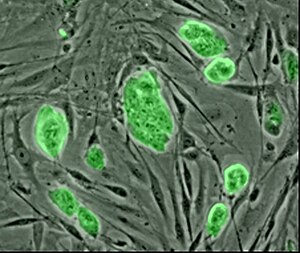 Artificial corneas grown in the laboratory have been transplanted into patient's eyes for the first time in an operation that offers hope to millions of partially sighted people. Scientists hope the breakthrough will also slash the cornea transplant waiting list which every year falls short by more than 500 in Britain alone.
Artificial corneas grown in the laboratory have been transplanted into patient's eyes for the first time in an operation that offers hope to millions of partially sighted people. Scientists hope the breakthrough will also slash the cornea transplant waiting list which every year falls short by more than 500 in Britain alone.
The new technique involves growing human tissue or collagen in the laboratory and then shaping it using a contact lens mould. Damaged and scarred tissue from the front of the eye is then removed and the "biosynthetic" replacement is stitched in its place.
Artificial corneas restore sight for the first time
U.S. Chose Not to Require Vaccine for Egg Threat
 Faced with a crisis more than a decade ago in which thousands of people were sickened from salmonella in infected eggs, farmers in Britain began vaccinating their hens against the bacteria. That simple but decisive step virtually wiped out the health threat.
Faced with a crisis more than a decade ago in which thousands of people were sickened from salmonella in infected eggs, farmers in Britain began vaccinating their hens against the bacteria. That simple but decisive step virtually wiped out the health threat.
But when American regulators created new egg safety rules that went into effect last month, they declared that there was not enough evidence to conclude that vaccinating hens against salmonella would prevent people from getting sick. The Food and Drug Administration decided not to mandate vaccination of hens — a precaution that would cost less than a penny per a dozen eggs.
Obama stem cell regulations temporarily blocked
 A federal judge on Monday temporarily blocked Obama administration regulations expanding stem cell research. The nonprofit group Nightlight Christian Adoptions contends that the government's new guidelines will decrease the number of human embryos available for adoption.
A federal judge on Monday temporarily blocked Obama administration regulations expanding stem cell research. The nonprofit group Nightlight Christian Adoptions contends that the government's new guidelines will decrease the number of human embryos available for adoption.
U.S. District Judge Royce Lamberth ruled that the plaintiffs are entitled to bring their lawsuit in the courts.A federal appeals court had ruled that two doctors who were among those bringing the lawsuit, adult stem cell researchers James Sherley of the Boston Biomedical Research Institute and Theresa Deisher of AVM Biotechnlogy, had the authority to do so, prompting Lamberth to reverse a decision he made last October.
Arthritis protein may reverse Alzheimer's
 Researchers found a protein triggered by rheumatoid arthritis could undo the "tangles" in the brain that are thought to cause Alzheimer's. Memory loss associated with the disease was partially reversed by the protein, GM-CSF, which also lowered the risk of getting the illness.
Researchers found a protein triggered by rheumatoid arthritis could undo the "tangles" in the brain that are thought to cause Alzheimer's. Memory loss associated with the disease was partially reversed by the protein, GM-CSF, which also lowered the risk of getting the illness.
Scientists at the University of South Florida even found that in some cases the memory impairment was completely reversed after treatment. The protein is commercially available and known as Leukine. As people with rheumatoid arthritis suffer swollen joints, the protein stimulates scavenger cells in the body. In tests on mice, these cells removed deposits left by Alzheimer's in the brain.
Feds found Pfizer too big to nail, so they looked the other way on massive fraud
 When the world's largest pharmaceutical company was found to have engaged in a massive illegal marketing campaign, federal prosecutors decided the company was too big to punish -- so they let it set up a shell corporation to take the blame.
When the world's largest pharmaceutical company was found to have engaged in a massive illegal marketing campaign, federal prosecutors decided the company was too big to punish -- so they let it set up a shell corporation to take the blame.
Yet when the government threatened Pfizer with prosecution for off-label marketing fraud, it realized that a conviction would, under federal law, require that Pfizer be excluded from Medicare and Medicaid -- and that this would probably put the company out of business.
Drugs don't work: Top professor claims five in six new medicines have 'little benefit' to patients
 A new study estimates that 85 per cent of new drugs offer few if any new benefits while having the potential to cause serious harm due to toxicity or misuse.
A new study estimates that 85 per cent of new drugs offer few if any new benefits while having the potential to cause serious harm due to toxicity or misuse.
The author of the research delivered a damning attack on 'Big Pharma' at a meeting of sociology experts in the US.
Professor Donald Light described the pharmaceutical industry as a 'market for lemons' - one in which the seller knows much more than the buyer about the product, and takes advantage of this fact.
More evidence links pesticides to hyperactivity
 A growing body of evidence is suggesting that exposure to organophosphate pesticides is a prime cause of attention deficit hyperactivity disorder, ADHD. The findings are considered plausible to many experts because the pesticides are designed to attack the nervous systems of insects.
A growing body of evidence is suggesting that exposure to organophosphate pesticides is a prime cause of attention deficit hyperactivity disorder, ADHD. The findings are considered plausible to many experts because the pesticides are designed to attack the nervous systems of insects.
It is not surprising, then, that they should also impinge on the nervous systems of humans who are exposed to them.
More Articles...
Page 143 of 233

 Health Glance
Health Glance






























